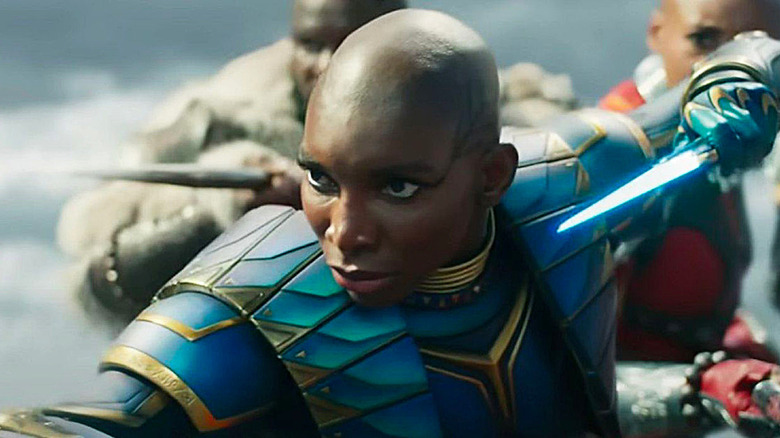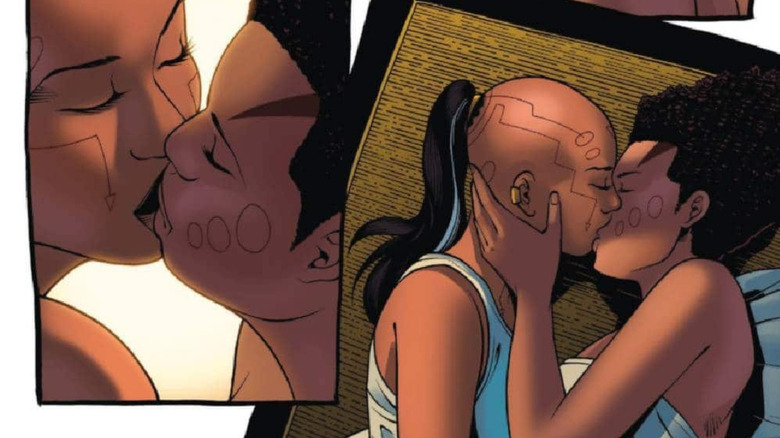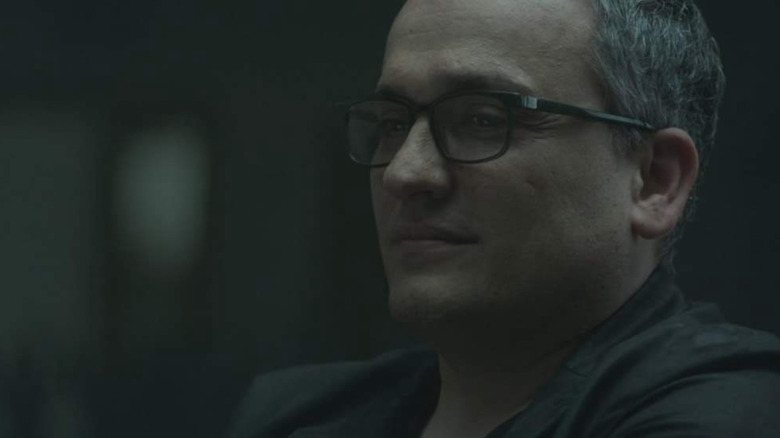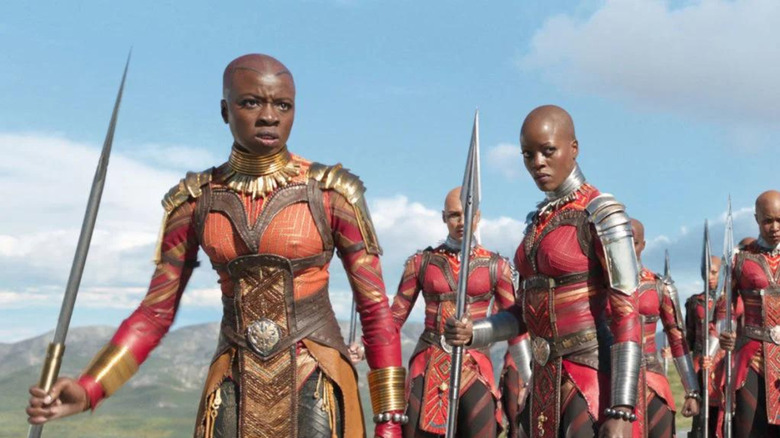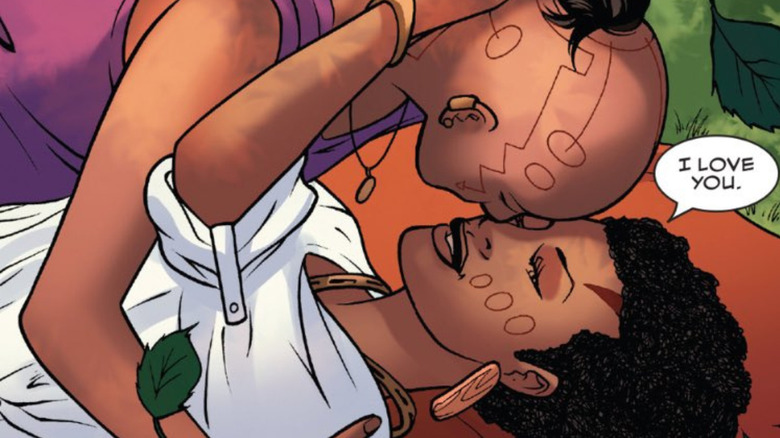Black Panther: Wakanda Forever Is The Latest Marvel Movie To Disappoint With LGBTQ Representation
This article contains spoilers for "Black Panther: Wakanda Forever."
It seems like we have this same exact conversation every time a new Marvel movie is released. We hear that an LGBTQ character is appearing in a film and anticipate them being an integral part of the plot, even if their powers aren't directly tied to their sexuality or gender. However, almost every single time this happens, they turn out to be easily discarded or ignored altogether. Perhaps they pull their partner in for one quick kiss, shot at a distance, and that's all you really see of them. It begs the question, why even say that a character is LGBTQ if you're not going to feature them at all?
It turns out that you'll have to ask that question again after you see "Black Panther: Wakanda Forever." While it probably isn't surprising that the Dora Milaje officer Ayo (Florence Kasumba) and combat warrior Aneka (Michaela Coel) aren't the main focus of the film, both they and their relationship get unfairly sidelined. Not only do they only have two scenes together, but neither character is given much screen time or development to make them feel like anything other than background characters. Given the weight of their comic relationship, as well as the sociopolitical tensions that their love represents, this is just one of many betrayals that the MCU has made against the LGBTQ community, which has constantly asked for better representation from the franchise.
Ayo and Aneka's story deserves to be told
In order to understand why their sidelining is so disappointing to see, you first need to understand the background of Ayo and Aneka's relationship. In 2016's "A Nation Under Our Feet" storyline by Ta-Nehisi Coates, the two were shown to be in a relationship after Ayo broke Aneka out of prison, where she was taken after killing a predatory chieftain. With the two of them ostracized from the Dora Milaje and Wakandan society as a whole, the two form the vigilante duo, the Midnight Angels.
Of course, this attraction had to come from somewhere. To tell this story, Coates teamed up with writer Roxane Gay for the "Black Panther: World of Wakanda" miniseries, which chronicled their emerging love story. Seriously, if you are in the mood for some real, non-toxic rivals-to-lovers stories, read this series for its very poignant romance and various societal themes.
The fact that their story, both as individuals and as a couple, is so fascinating makes their appearances in "Wakanda Forever" that much more disappointing. Their only scene of intimacy is when Aneka quickly kisses Ayo on her head at the end of the film. This might be fine if they were better established as individual characters beforehand, but they aren't – Aneka is seen talking with Shuri in the lead-up to a pivotal scene, and Ayo sometimes appears as the Dora Milaje's replacement to the ousted general Okoye (Danai Gurira). It is like they are just background stock characters, and that's incredibly dishonest.
This isn't the first time
Perhaps what makes this so frustrating is that it is far from an isolated incident. The MCU has had a bad history of hyping up the introduction of LGBTQ characters, only for the payoff to not be worth it. Remember when the Russos said there would be a gay character in "Avengers: Endgame," only for said character to be a throwaway support group member played by Joe Russo himself? Remember when America Chavez was finally introduced to the MCU, but her mothers were killed seconds after they were introduced — and her own sexuality was never acknowledged? This isn't even taking into consideration Loki's passive coming-out, Valkyrie's unnamed lover getting killed, and Phastos being both openly gay and also sort of responsible for the concept of nuclear warfare.
This is all to say that, despite releasing movies since 2008, there have arguably been no fully developed LGBTQ characters or relationships in the MCU, despite them constantly promising their inclusion. It's not like these characters are only defined by their sexuality, but they need to feel like actual humans you can connect with on a level that isn't shallow. It isn't enough to say that characters are gay during promotions and not have them follow up on that in a meaningful way in the finished product. A character kissing another on the head means nothing when they only exchange two lines of dialogue with each other, nor when either character only has a few minutes of screen time each.
Is sociopolitical bigotry a factor?
Of course, discussions around LGBTQ representation deserve to be as nuanced as possible. There is the possibility that Ayo and Aneka's relationship was significantly trimmed down due to homophobic international laws. Marvel has previously had issues with countries such as Saudi Arabia for their inclusion of LGBTQ characters, and the fact that 33 countries in Africa criminalize same-sex relationships through outdated colonial laws (via Human Rights Watch) could have also contributed to their exclusion in "Wakanda Forever." This hostility is actually part of the reason why Michaela Coel, who is British-Ghanaian, signed on for the role. Ghana is among the 33 African countries that criminalize LGBTQ individuals.
"I thought: I like that, I want to show that to Ghana," the actor and Emmy-winning writer told Vogue. "It felt important for me to step in and do that role because I know just by my being Ghanaian, Ghanaians will come."
However, it is unfair to lay the blame entirely on these countries. After all, it's not like the U.S. is any better – while same-sex relationships and marriages are legal, homophobic policies like Florida's HB 1557/"Don't Say Gay" Bill and major social and political figures spouting dangerous transphobic rhetoric have contributed to a tense environment for queer Americans. Disney itself faced backlash for its political donations against homophobic and transphobic Republicans earlier this year. The erasure in "Wakanda Forever" seems to be a combined effort of domestic and international beliefs that LGBTQ stories aren't necessarily important to tell.
Can the MCU actually deliver?
For a franchise that has been going on for as long as the MCU has, it's terrible that we still haven't received a properly developed and nuanced LGBTQ character. If we're being honest, it's hard to imagine such a character actually being introduced nowadays – if they were serious about representing marginalized communities in defiance of domestic and international bigotry, they would have done it by now. However, Disney and Marvel have not delivered the characters, stories, and representation fans deserve.
While a lot of "Wakanda Forever" is great, its two-hour and forty-five-minute runtime shouldn't only have five seconds of queer intimacy. Ayo and Aneka's relationship in the film was specifically designed to be kept ambiguous or even cut out if need be. That does a massive disservice to queer MCU fans, especially those in deeply homophobic or otherwise intolerant environments. The promises of representation they make need to be kept more than ever before, and if they are, then that very representation needs to be more than just a throwaway character. If they are queer in the comics, then their story needs to be properly adapted. It's as simple as that. Until then, the saying about getting queerbaited by the MCU being similar to losing a game of chess to a dog will remain eternally true.
